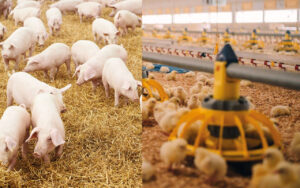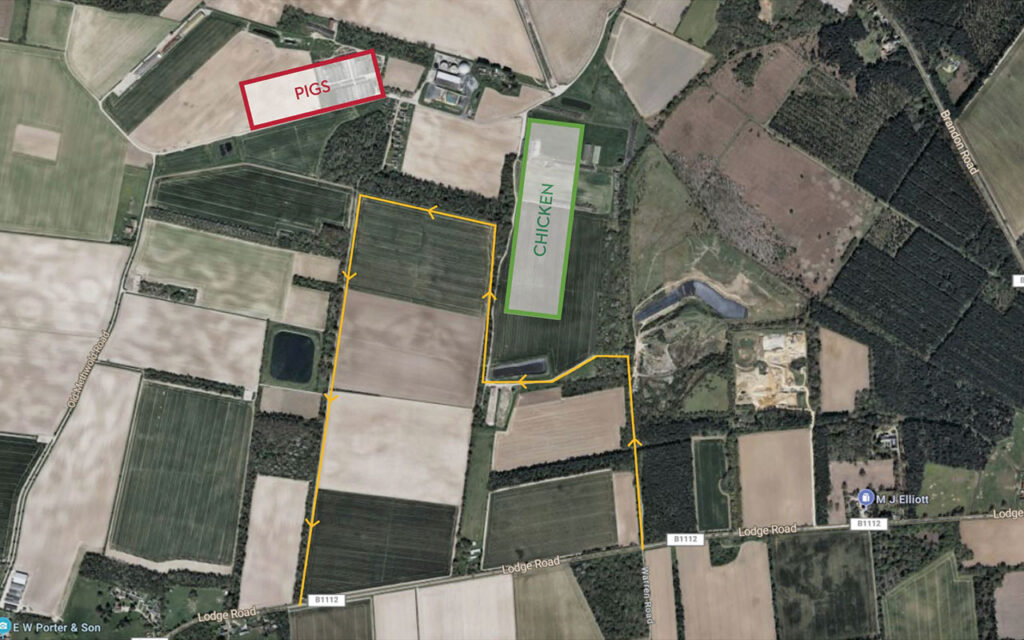Cranswick has mounted a robust defence of its proposal for a large pig and poultry unit in Norfolk, after planning officers recommended that it should be rejected.
Its application to expand an existing site to house 14,000 pigs and 714,000 chickens near the villages of Methwold and Feltwell is due to be considered by King’s Lynn and West Norfolk Borough Council’s planning committee on Thursday, April 3.
But in a blow to the Hull-based company, in a 200-page report published in March, planning officers recommended that the application should be refused for two reasons.
With the site lying close to a number of European protected sites, planning officers said Cranswick had failed to demonstrate that the development ‘would not result in significant adverse effects on the protected sites’.
They also concluded that insufficient environmental information had been submitted to enable the council to reach a view on the impact of the project on the environment and climate change.
The report stated: “The public benefits of the development as proposed are outweighed by the potential environmental impacts of the scheme. The Council are not in a position to fully assess these impacts, despite the number of opportunities presented to the Applicant to submit further information, and as such the application should be refused.”
Cranswick response
Despite the setback, Cranswick insisted it was pushing ahead with its application and, days before the scheduled hearing, it published its statement to the planning committee.
It reiterated its arguments that the development will:
- Ensure better use of local land, improving the existing site, which currently permitted by the Environment Agency to house 29,000 pigs. Although it will be investing significantly in the sites to deliver improvements, the new farm will not look particularly different to other farms across Norfolk, Cranswick said.
- Deliver higher welfare for pigs and poultry. All pigs at the farm will be reared to RSPCA Assured
Standards, beginning their lives outside, before moving into the new straw-based barns, while the number of chickens housed in a unit will be reduced by 20% compared to the Red Tractor standard and 100% of chickens will born in the barn, rather than at a hatchery facility, under the NestBorn system. - Improve British food security, reducing the country’s reliance on imports. Currently, only 50% of the pork we eat is produced in the UK and 30% of all the chicken we consume is imported.

The document stated: “We look forward to the meeting and to having the opportunity to address the Committee and answer any questions. Meanwhile, we want to ensure that the Committee is clear on the purpose of the proposals and the details included.
“The UK is not self-sufficient in pork and chicken and this proposal helps secure the supply for increasing demand of sustainably produced British meat. This is all about producing more British food, to higher welfare standards, through the redevelopment of existing farms.”
Objections
The planning officer report reveals the plans received 12,604 objections, a 42,133-signature petition and seven representations in support. Objectors included five parish councils, a local campaign group, two local MPs and several NGOs.
Cranswick said it ‘fully recognised that a range of concerns and views have been expressed by local stakeholders and residents’, and had worked hard to address the issues.
But it criticised the approach of the council, noting that it was ‘extremely disappointed’ to find that the council’s report was ‘littered with basic factual errors’.
The company said these include text ‘literally copied and pasted across from the chicken application to the pig application, without any attempt at correction’, ‘false statements’ about ‘redundant agricultural sheds’ and the location of the proposed pig units and no reference the six responses on sustainability Cranswick has have provided within the Planning Statement.
It also highlighted and ‘factually incorrect’ statements referencing the Finch ruling and that a climate change assessment is required. Finch requires indirect emissions that are inevitable and quantifiable to be considered, Cranswick’s statement said.
“After over three years of patient engagement with the Council on this application, we cannot understand how these and other errors have been included and published in the planning report. We are concerned about the Committees ability to judge the proposals impartially based on the inaccuracies reported,” it said.
Cranswick said it had fully responded to all requests from the council to provide more information. However, it said that in the run-up to the hearing, the council said it needed further information, but was not clear what that information was and had not given it time to provide it.
“It is not for us to judge whether this represents fair and due process, but it is not consistent with the efforts we have made to be open with the Council over the pastthree years,” it said.
It urged the committee to ‘support this application in recognition of its positive contributions to the local and national economy and to UK food security’.
Council comment
A council spokesperson said councillors would ‘consider the applications professionally and objectively on the planning issues, as they would any other application’, the BBC reported.
It said Cranswick’s comments would be sent to the decision-makers as late representations “in line with usual planning committee procedure”. “The applicant will also have the opportunity to address members on the matters they raise at the planning committee meeting,” the spokesperson added.




